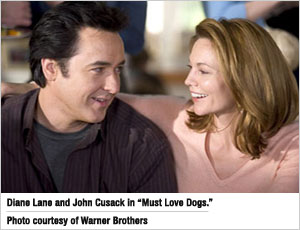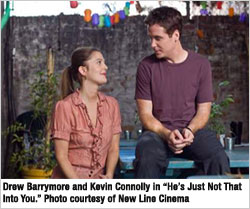Mail order brides, arranged nuptials, and matchmaker marriages are among the time-honored mating services people have used from the very beginning of the human experience — think Adam and Eve, a match made in ‘heaven.’ Those early unions joined not just the bride and groom, but two families who would often benefit from an infusion of cold hard drachmas, more land or an extra goat or two. In short, matchmaking was a business.
Fast forward to the U. S. in 2011 where matchmaking has evolved into an Internet love fest and where the modern search for a mate often begins and ends on the web. With 43 percent of the 18-and-over population single, browsing dating sites, checking out thousands of pictures and profiles, and evaluating who has the criteria and winning smile to make the cut is the new form of courtship. Actively seeking a mate on line used to be a no-no for young, hip daters.
Today, it’s not only socially acceptable, it’s often the only way to find an eligible partner. The result: companies that function as online cupids have been thriving in spite of the great recession (or in part, because of it). “Fifteen years ago, somebody who used a dating service, let alone an online dating service, was regarded as somebody who had three heads,” said Helen Fisher, a biological anthropologist and chief scientific advisor to Chemistry.com, the sister site of Match.com, which pioneered online dating in 1995. “Now we all know somebody who has been on one.”
Online Dating, by the Numbers
In 2006, one in 10 American Internet users said they or someone they know had visited an online dating site. Today, that percentage has tripled according to the Pew Research Center. The global dating and matchmaking industry as a whole will generate about $4 billion in 2011, of which about $1.135 billion will flow from the approximately 1,400 U.S. dating websites, said Caitlin Moldvay, a dating research industry analyst at Ibis World.
“There is no market cycle to love. Love is never out of style,” said Sam Yagan, CEO of OkCupid.com, an industry leader among free dating sites, which was acquired for $50 million last week by Match.com — the longtime online dating industry leader which charges $30-$60 per month in membership fees. Yagan says the recession may have helped his business grow since during tough times, human beings seek companionship and community. “You’ve gotten laid off at work, or are working fewer hours, and the last thing you want to do is sit at home by yourself and feel miserable about your personal life.” Yagan says his business nearly doubled in 2010 to reach 7 million visitors each month.

The largest player in the U.S. market with just under 19 percent market share is InterActiveCorp (IAC), owner of Match.com, Chemistry.com and 27 other niche dating sites such as SeniorPeopleMeet.com and Singles.net. The second largest, with a 12.4 percent share of the market is eHarmony.com with revenue of $250 million last year. According to a spokesperson at Match.com, the fourth quarter of 2008 was one of the strongest ever. Even though the country had been shaken by the stock market, the number of subscribers grew by 5 percent. The upward trend continued into 2009 and 2010, with IAC reporting a 30 percent revenue hike in its dating sites in the fourth quarter of 2010 and Match.com having its strongest quarter to date.
Why Such a Boom?
One of the reasons for the spike in the industry’s revenues is that it’s “a relatively inexpensive form of entertainment,” said James Houran, a psychologist and columnist for OnlineDatingMagazine.com. “Most sites charge somewhere between $30 and $50 a month for membership. And in the grand scheme of things that’s fairly inexpensive for the potential return on that investment.” But the recession is not the only engine revving online dating companies.
Another reason is that women have become more economically powerful, Fisher said. With women increasingly remaining in the job market, the notion of marrying the boy they dated in high school or college is being left in the dust, she said. “As women marry later and become less economically bound to their spouses, they’re more likely to walk away from bad marriages in order to make good ones,” she said. This increasing trend of marriage, divorce, and remarriage means women and men are looking for a partner in their 30s and 40s, and once again in their 50s, 60s and 70s, Fisher said. “By the time they reach that age, they already know everybody at work, in their neighborhood, and in their social circle. So where are they going to meet people if not with dating services?”
As baby boomers age out of marriages or into widowhood, more of them will seek romance online, Fisher said. In fact, the 50-plus age group is the fastest growing demographic on both Match.com and eHarmony.com.
The ‘Best’ Way to Date?
Psychologists and relationship experts tend to agree that online dating is a more effective way of screening potential mates than at a chance meeting at a bar or social space. “It’s an incredibly efficient way of finding people who are like you,” said Christine Whalen, a sociology professor at the University of Pittsburgh and author of Why Smart Men Marry Smart Women. “It expands your social network; it makes you open to people who are not just at the right place at the right time at a particular party, but who are putting themselves out there like you are.” People can also be pickier online than on a blind date. “We restrict our searches to people who have minimum education, income, a certain faith or ethnic background and all sorts of other characteristics we likely wouldn’t know if we were meeting someone for the first time at a party or bar,” she said.
 For similar reasons, some behavioral economists and psychologists say online dating sites do not allow people to successfully or efficiently gauge another person’s defining qualities. According to Dan Ariely, a professor at Duke University and author of Predictably Irrational, online dating is a “market failure” of sorts that is essentially like flipping through catalogs of people. “Online dating sites basically take people and break them into attributes — but that’s not the way we as human beings experience people,” he said. “It’s like if I took a vegetable and described it to you in terms of what color it was and how many calories, enzymes, and vitamins it had and then asked you how much you would love this vegetable. You won’t know.”
For similar reasons, some behavioral economists and psychologists say online dating sites do not allow people to successfully or efficiently gauge another person’s defining qualities. According to Dan Ariely, a professor at Duke University and author of Predictably Irrational, online dating is a “market failure” of sorts that is essentially like flipping through catalogs of people. “Online dating sites basically take people and break them into attributes — but that’s not the way we as human beings experience people,” he said. “It’s like if I took a vegetable and described it to you in terms of what color it was and how many calories, enzymes, and vitamins it had and then asked you how much you would love this vegetable. You won’t know.”
The Need for Speed
Instead, Ariely says his research has indicated that speed dating is more effective. Speed dating was invented in 1998 by a Los Angeles rabbi, and functions like a dating musical chairs of sorts by bringing usually twenty or thirty daters together and giving each of them four or five minutes to chat with each potential partner in between whistle blows. Usually after meeting people for a speed dating event, men want to meet about four or five of the women they’ve spoken with and women want to meet about two or three of the men, Ariely said. “That’s a huge percentage compared with people who look online at hundreds of profiles — and proportionally reach out to very few of them,” he said.
As the online dating market grows, smaller ventures like speed dating, which is expected to rake in $42.1 million this year, are being propelled upward, too. To the surprise of Michael Karlan, owner of ProsInTheCity.com — a professional networking group in six major U.S. cities — speed dating has evolved into the company’s most popular offering and biggest source of profit over the last ten years. “A lot of the time, people who come to speed dating like to try online dating first because it looks great. You’re a guy on the prowl, you see all these really cute girls and you email them,” he said. “But the reality with online dating, or the fallacy of it, is that you can’t get someone better online than you would get in real life.”
The speed dating sessions he runs are tailored to specialized groups including Muslims, lesbians, travel-lovers, and any other group that crops up in large numbers in the cities he operates in. “So not only are you meeting a bunch of people, you’re meeting a bunch of people who are relevant to what you’re looking for.” Speed dating coupons are even offered now on the highly trafficked daily deal web site Groupon.
Demographic targeting is also available online, often for free. “Niche dating sites have been actually expanding revenue faster than the rest of the industry,” said Moldvay, citing BlackSingles.com, SeniorPeopleMeet.com, and ChristianMingle.com. “And companies which operate paid dating sites and free dating sites are reporting that their smaller, niche dating sites are growing quickest.”
Why Will the Beat Go On?
Dating industry experts and executives say Americans’ appetite for online dating will grow even more in the coming years as services ramp up their mobile presence. Match.com, eHarmony.com and OkCupid.com offer mobile applications, but most are not yet widely used. To change that, these companies will roll out location-aware apps in the coming months, according to Yagan of OkCupid. “The mobile craze hasn’t really hit yet, but 2011 is going to be the year that mobile really breaks out into dating,” he said. “Location-aware apps let a dater who is already out and about know there’s a guy or girl three bars down that’s a great match for them — that’s incredibly convenient for someone on the go, and makes it easier for that person to get out on a real live date quicker.”
Despite new technical innovations, online dating is really just a more digitized form of what human beings have always done. Fisher says, “For millions of years, in hunting and gathering societies, we knew a great deal about somebody before we ever opened our mouth and spoke with them. With all the information online dating provides we are really going back to a pattern that is quite compatible with the way the brain is built.” And once you go on that first date, the courtship process remains exactly the same. “So if you screw it up at that point or it doesn’t work, you can’t blame the Internet.” And rest assured there are lots of fish in the virtual sea waiting just for you.
Related Links
Does Online Dating Work? (Discovery News)
Online Dating Enjoying a Boom Among Boomers? (Time)
True Love? Be Careful, BBB Warns (Charlotte Observer)



